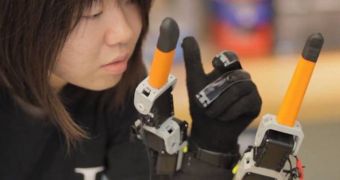Brainiacs with the Massachussets Institute of Technology in the United States have developed a set of robotic fingers that they say can help people get a better grip on bottles, bananas and the like.
Unfortunately, it looks like science is not yet advanced enough to roll out robotic fingers your average Joe and Jane could hope to use to get a better grip over their lives. Still, one can only hope this will one day happen.
The robotic fingers developed by Massachussets Institute of Technology researchers were introduced to the world earlier this week, during the Robotics: Science and Systems conference in Berkeley, California.
As detailed in the video below, these artificial fingers are part and parcel of a robot that one can easily attach to their wrist. They are well capable of synchronizing their movements with those of the wearer's real fingers.
Consequently, they can be used to lift fairly big or heavy objects using just one hand. What's more, the researchers who developed them claim that they are precise enough to help folks twist off a bottle cap, a press release on the matter at hand informs.
The coolest thing about these robotic fingers is that one does not have to command them individually in order to make use of them to perform various tasks using just one hand. On the contrary, the fingers are engineered in such ways that they react to natural movements on their own.
“This is a completely intuitive and natural way to move your robotic fingers. You do not need to command the robot, but simply move your fingers naturally. Then the robotic fingers react and assist your fingers,” says researcher Harry Asada.
Together with the other scientists who worked on this research project, Harry Asada maintains that these fingers are so precise and efficient at following natural ones around and assisting them that, in time, a wearer could perceive them as part of their anatomy.
More so given the fact that humans are no strangers to perceiving tools that they use for considerable periods of time as part of themselves. “Like a tool you have been using for a long time, you feel the robot as an extension of your hand,” Harry Asada explains.
Although it might be a while until such fingers become available to the general public, the Massachussets Institute of Technology scientists hope that, one day, their creation will help people with reduced dexterity perform tasks they would otherwise have trouble carrying out.

 14 DAY TRIAL //
14 DAY TRIAL // 